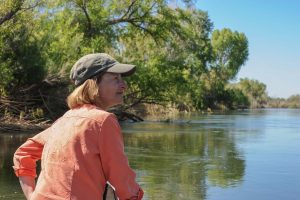This is our 100th episode!
If you like Down to Earth, please support it by clicking HERE.

Sandra Postel has devoted her life to studying the world’s freshwater systems, and they’re not looking so great right now. Because a combination of over-allocation, over-engineering, over-use, and climate change, we’ll be in trouble if we don’t address the problem soon—in fact, we’re in trouble now. But the solutions are there, and already in place on a small scale, and they involve working with nature rather than against it to restore the natural flows and stay in balance.
Sandra Postel is one of the world’s leading experts on water. She’s director of the Global Water Policy Project, and she’s author of several books and many articles on water, including her most recent, Replenish: The Virtuous Cycle of Water and Prosperity, a new edition which is being released this year. She was recently awarded the 2021 Stockholm Water Prize for groundbreaking work that has changed how people view water.
PS This is the 100th episode of Down to Earth! Please support the show by clicking here. And if you would like to send me a note with any comments, questions, or ideas, that would be awesome, please write to me at mc@radiocafe.org.
Photo of Sandra Postel by Cheryl Zook/National Geographic.
Water photo by Jason Leung on Unsplash
2’22 how is the water cycle broken
2’50 dams on half the world’s rivers
3’20 connection between river and sea is broken
3’48 watersheds and fires
4’02 deforestation
4’11 building in flood plains
4’23 soils
4’38 climate change changing water cycle globally
4’55 atmosphere can hold more water, causing extremes of weather/precipitation
6’17 cascade of consequences
7’04 how a levee works and what happens during extreme events
8’45 the command and control way of thinking about water
10’22 the Faustian bargain side of the engineering achievements
11’07 false sense of security
11’23 Lake Powell and Lake Mead at lowest levels ever
12’04 Colorado River overallocated
12’25 not everybody was at the table, including Native Americans, Mexico, and the river itself
13’26 confronting the idea that technology will save us
13’51 the problem thinking of natural waterways as plumbing systems
14’11 good technologies can help us to conserve water, manage demand
15’44 thinking about all life, not just people, and thinking about ourselves as part of an ecosystem
16’16 human exceptionalism
16’37 reconnecting to the web of life, feeling that connection
17’34 thinking about stewardship as self-preservation, protecting the web of life
17’59 giving rights to nature
18’25 Ecuador and Bolivia recognized rights of nature
18’36 New Zealand granted legal personhood to a major river
19’06 in U.S. Native American law has furthered legal protection of nature
19’22 Bangladesh recognized rights of the country’s rivers
20’26 treating the natural world as family connections
21’28 groundwater being pumped for agriculture
21’49 groundwater as insurance during a drought
23’01 satellites were able to show us the depletion of global underground water supplies
23’53 California has been trying a way to recharge ground water on agricultural land
24’32 the process of aridification…it’s not just drought, but it’s a one-way trend toward drier land
25’59 snowmelt in the Rockies decreased because of aridification
26’29 so normal precipitation does not guarantee normal water supply
27’12 we have the solutions, why are they not being implemented?
27’43 James Hansen sounded the alarm in 1988 but nothing happened
28’28 climate change is now really affecting us
28’53 attribution science
30’12 still no bipartisan consensus in climate change
30’48 water and nature-based infrastructure is not getting sufficient attention or investment
31’24 flood plains
32’03 need to solve water, climate, and biodiversity problems together rather than piecemeal
32’22 the problems of siloes bureaucracies
32’54 healthy soil is a massive water reservoir, if we manage it properly
34’22 using cover crops, improving yields, preventing water pollution
36’41 using technology to sense how much water is in the soil, to conserve water
37’41 slowing down and thinking in the long term
38’13 how can we pick up the pace and implement these solutions more quickly
40’17 population decline
40’52 making sure to keep the focus on consumption
41’55 how citizens can make a difference in their own lives an in public policy
44’26 everything we are seeing will get a lot worse
44’50 getting young people involved and engaged
45’19 the New Deal Civilian Conservation Corps serves as a model for our time
47’39 green infrastructure in cities
49’12 link to Sandra’s website
49’22 new edition of Replenish book coming out



Subscribe:
Apple Podcasts
Spotify